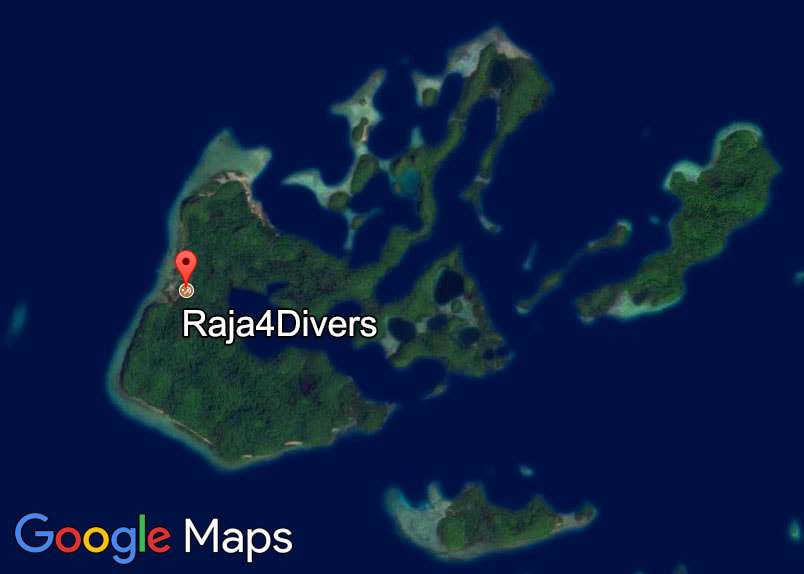|
Roughly 50% of our employees that work on Pulau Pef are Papuans. We consider it our mission to give local people jobs and allow them to profit from a resort on a remote island like ours. Other than fishing and growing fruit and vegetables, they don’t have many possibilities to make a living in West Papua. So tourism is a welcome source of income, as long as it involves local people.
Very often, these employees have little or no education when they come here. We train them in various areas and they typically get to work in various departments during their stay with us. This sometimes means a lot of work and nerves for our senior staff and management, as the trainees are not used to learning the way we are. I only fully realized this a week ago when Jonas Müller from ChildAidPapua.com visited us, a Swiss who has been teaching local kids for four years in a remote little village about 50 mins by boat from here. He presented his project to our guests after teaching the local kids from our neighboring village Kabui about protecting the reefs and about waste management. We learned that schools in West Papua theoretically have teachers for every grade. The teachers are on the payroll and get paid by the state, but hardly ever show up, especially in remote villages. This results in one or two teachers having to teach all levels at the same time. Or school simply not taking place! The kids do take national exams at the end of the school year and the majority passes them with good results. But apparently, they receive the correct answers up front from their teachers, so these national results are not representative of their knowledge. On top, their teachers - having had the same “education” - don’t really know the subject matter they teach and are not capable of answering their student’s questions. The fact that these kids don’t learn how to use their own brain, but merely follow orders and execute them, reflects in their work as adults at our resort. Many of them expect us to simply give them orders without wanting to understand why they should do it. Jonas gave a good example to illustrate this: plastic waste is an important topic in their teaching. The kids know they are not supposed to throw plastic away because “white people don’t like that”. They don’t do it, but only as long as there are “white people” around. As soon as they turn their back, the kids think it doesn’t matter anymore since the “whites” are gone. They don’t understand the consequences of their deeds, and this is exactly what is missing in their education – figure out what the consequences are and therefore try to avoid doing certain things. It seems so obvious for us to teach our children the reasons behind our actions and why something works the way it does. I feel it would be our priority to teach the kids here what beautiful treasures they have above and below the water and how important it is to protect them, because this is what the tourists come here for. But how can you expect the teachers to know that if nobody told them either? All children are eager to learn and study. As a matter of fact, the Kabui kids complained to Jonas that he hadn’t come back for too long because they really love his classes! But Jonas and his Indonesian colleague are only 2 people, teaching approximately 600 children and regularly travelling to remote villages without access to their classes. It’s a huge job and it seems almost impossible. But they already have some success and were able to send some of their students to high school in a bigger city. Next year, we will even get an ex-student of Jonas' as intern to work at the resort for 2 months. What a success story! It’s baby steps, I know, but let’s hope there will be many more!
1 Comment
|
#TalkingWithMangrovesI never even dreamt of working on a remote island in Indonesia, but life has a way of taking care of itself… Archives
May 2021
|
LocationPulau Pef - Raja Ampat - Indonesia
|
Follow Us
Our Office in SorongJl. Gagak No.7 B, Km 7 Gunung, RT.001 RW.002
Kelurahan Malengkedi, Remu Utara PO Box No.130 Sorong 98416 – Papua Barat - Indonesia Phone +62 (0)811 485 7711 |
Rates and information are subject to change without notice. Terms and Conditions apply. All rights reserved.
Imagery is copyrighted and may not be used without express permission and written consent.
Images and videos of the following photographers / videographers were used for this website:
Barbara Moll, Claudia Peyer, Pere Rubio, Thomas Haider, Filip Staes, Christian Kaufmann, Dos Winkel, Duri Mayer, Jürgen Freund,
Daniel Brinckmann, Amanda Künzle, Joram Zimmermann, Ramon Sibold, Roman Keller, Barbara & Markus Aichinger, Fabienne Hadorn, Andreas Hadorn,
Armin Keller, Marcel Rudolph, Sabrina Inderbitzi, Peter Löseke
© 2024
Imagery is copyrighted and may not be used without express permission and written consent.
Images and videos of the following photographers / videographers were used for this website:
Barbara Moll, Claudia Peyer, Pere Rubio, Thomas Haider, Filip Staes, Christian Kaufmann, Dos Winkel, Duri Mayer, Jürgen Freund,
Daniel Brinckmann, Amanda Künzle, Joram Zimmermann, Ramon Sibold, Roman Keller, Barbara & Markus Aichinger, Fabienne Hadorn, Andreas Hadorn,
Armin Keller, Marcel Rudolph, Sabrina Inderbitzi, Peter Löseke
© 2024

 RSS Feed
RSS Feed

